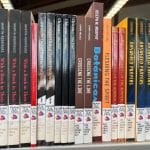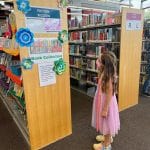Know your history, know where you're going: Passing the torch to our local librarians
blog post by Selina B.
This blog post mentions Lydia R. Otero's books La Calle, opens a new window and In the Shadows of the Freeway, opens a new window. We'll be hosting Lydia on October 16th (10 to 11 am) as part of our annual LGBTQ+ Author Talk.
Our southwest region and Tucson roots are rich—rich with knowledge and stories from our community. Our libraries are places where we can search for some of these stories and our local librarians are seen as our community scholars. During this past year, I heard about the Frank De La Cruz Collection, opens a new window. I was unaware of who Frank De La Cruz was and decided to do some more research and learn more about this man and the impact he continues to have on our Tucson landscape.
I paid a visit to the Frank De La Cruz Collection at the Quincie Douglas Library, opens a new window. The collection has been housed at this library since 2020. The collection focuses on U.S/Mexico Borderland history, culture and traditions. All of the books provide a framework of the Mexican/Chicanx experience along the border, especially within the southwest region and offers insight into the contemporary issues facing our community.
The books within the collection include topics and analysis of 500 years of cultural and political evolution of the Mestizo Southwest community. Titles include Beloved Land: An Oral History of Mexican American in Southern Arizona, opens a new window by local author Patricia Preciado Martin and Decolonize Your Diet: Plant-based Mexican-American Recipes for Health and Healing, opens a new window by Luz Calvo, a professor of Ethnic Studies at Cal State East Bay. Historically, narratives like this have been erased, rarely spoken about, or shared. The FDLC Collection encourages the recognition of the importance and value of this region and its people. Also, to illustrate the role those of Mexican descent have played in our country’s identity, growth and prosperity.
This collection is very exciting for our Tucson community, the southwest region, and beyond. It highlights stories that have traditionally been devalued and/or discontinued altogether. This is why we are so excited and eager to have the FDLC Collection within hands reach. It provides the community an opportunity to feel pride, to fully celebrate and embrace the cultural, historical and social testimonies of the southwestern states, especially here in the state of Arizona. I wanted to bring my two daughters to witness the collection first hand. Although both are too young to read the books (they are 7 and 3), I still wanted them to see the stories on the shelf, as they are an authentic reflection of who they are—their roots. This is a permanent collection and will be here for generations to come!
Who was Frank De La Cruz?
Frank De la Cruz was a librarian of the Pima County Public Library (PCPL) at El Rio Library, opens a new window in the El Rio Neighborhood Center on the west side of Tucson. This center has a rich history, especially with the neighborhoods of Barrio Hollywood and Barrio Sovaco. In 1972, El Rio Neighborhood Center was the result of the Chicano/a youth and families from the westside; they were the ones who initiated what we are able to enjoy today, including the library and other youth and adult programming.
Frank passed away in 2015, and inspired the Pima County Library and staff to continue the collection that he had already started at El Rio Library; the visions of highlighting this region's history and legacy. Now, just like Frank De La Cruz fought for resources, just like El Rio Neighborhood Center, the torch has been passed on to our local librarians like Lupita Guerrero. Lupita Guerrero is the Branch Manager of Sam Lena-South Tucson Library, opens a new window. It was through her advocacy that our community has access to the Frank De La Cruz Collection. I wanted to know the why. Why did she think this collection was important and why Frank De La Cruz? So, I decided to sit down with both Lupita and Marissa Alcorta, Branch Manager at Quincie Douglas Library to get a better sense and understanding of the Frank de la Cruz Collection.
Why did you decide to initiate this collection?
Lupita
I remember back when Frank passed in late 2015, library staff began reminiscing about all the ways he served and advocated for the Tucson community. Throughout the thirty-five years he worked as a librarian, Frank was a quiet warrior. During his time at El Río Library, he started a small community archive that included documentation on the community activism that helped make the neighborhood center and library a reality.
By the time Frank was no longer with us, the archive was only a memory. This was very disappointing to all the residents and El Rio Library staff. Frank’s passing, coupled with the community’s ongoing struggle against TUSD’s ban on ethnic studies, is what motivated me to propose a special collection that would focus on the Mexican American history and culture of the Borderlands
What do you love most about the collection?
Marissa
I love that this collection is in honor of Frank De La Cruz, who I knew personally. I think he would have loved it and be pleased that it’s available to the Tucson community he loved. I also love that it focuses on Latinx, Chicanx, Indigenous themes and subjects that community members, especially youth, may not have access to in school.
What book in the collection is your favorite?
Marissa
I don’t have just one, but I am really interested in the cooking books we have in the collection as well as the books on Curanderaismo.
Lupita
There is absolutely no way I could name just one favorite! The collection contains such a variety of fascinating topics – from cookbooks to poetry, art, folk medicine, music, biographies, history and more. The collection has copies of both La Calle: Spatial Conflicts and Urban Renewal in a Southwest City and In the Shadows of the Freeway by Lydia Otero, a cherished local author. Tucson residents would definitely find these two books relevant to our local history.
Read the full interviews here: Lupita Guerrero, opens a new window, Marissa Alcorta, opens a new window
In addition to Beloved Land and Decolonize Your Diet, here are some other titles you'll find!






